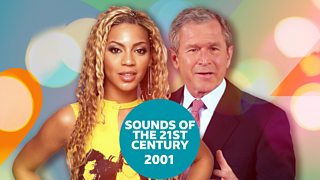From Wizards to Wernham Hogg to Wikipedia: 21 memorable moments from music and popular culture in 2001

Sounds of the 21st Century is a new series of eleven soundscapes featuring the music, media, news, triumphs, tragedies, and trivia from the years 2000 to 2010.
The Sounds of 2001, available now on �鶹������ҳ��� Sounds, recalls the year of 9/11, George Bush’s first year as the 43rd US President, Tony Blair’s second landslide election victory in the UK, and foot-and-mouth disease.
It was also the year a brand new device was launched that allowed your entire record collection to be kept in your pocket, a new website began cataloguing the history of pretty much everything, two famous wizards hit the big screen, while boy bands and girl groups dominated the UK charts.
Below we look back on a selection of big moments from the year in music and popular culture, 20 years on…
-
![]()
Listen to the Sounds of 2001
Claudia Winkleman introduces music, media, triumphs, tragedies and trivia from the year of 9/11, the iPod, Murder on the Dancefloor, David Brent, Hear'Say, Bridget Jones and much more. No comment, no analysis, no hindsight, no celebrity memories, just the 'sounds' of the year.
1. A pocket-sized device revolutionised how we listen to music

"Listening to music will never be the same again." These were the words that late Apple CEO Steve Jobs used to introduce the world to the tech company’s latest project, the iPod, in its launch press release during October 2001. His grand words may have seemed like a bold claim at the time, but few would argue against it with the benefit of hindsight.
Other MP3 players may have existed at the time, but there wasn’t a clear market leader in the booming industry of digital music media. With the iPod though, Apple came up with a generational product that incorporated slick design, ultra-portability and the capacity to store 1000 songs on one device.
“With the iPod, Apple has invented a whole new category of digital music player that lets you put your entire music collection in your pocket and listen to it wherever you go,” Jobs continued in his statement, while adding in his live launch event speech: “I happen to have one in my pocket, my friends. There it is, right there.”
The iPod went on to sell close to 400 million units, and changed the way people consumed music. The product may now be mostly obsolete (only one iteration, the 7th generation iPod Touch, remains in production), but its influence lives on in the music libraries we all carry around on our smartphones.
Meanwhile, iTunes - which also launched in 2001 - could be seen as a forebear for music streaming services like Spotify.
2. Hear'Say were the first in a new generation of TV created pop stars

Before The Masked Singer, The Voice and even X-Factor came a TV singing contest that kicked off a change not only in television but the pop music landscape as a whole. In January 2001, the UK series of Popstars - an international franchise that originated in New Zealand - first aired on ITV. Making head judge “Nasty Nigel” Lythgoe and Radio 2's Nicki Chapman household names, the show - while controversial - proved a ratings smash as the viewing public were captivated by the peak behind the curtain of the music industry.
The inaugural series of the show featured highlights including Darius Danesh’s infamous rendition of Britney Spears' '..Baby One More Time', while winners Hear'Say and Liberty X became instant chart successes. "It was the first show of its kind," Hear'Say singer Kym Marsh - now better known for her Coronation Street role and hosting the �鶹������ҳ���'s Morning Live - recently . "It gave me an amazing start in my career and I will always be grateful."
Later in the year, Darius was back as one of the contestants in the first series of Pop Idol, which would eventually culminate the following February, with Will Young crowned winner, and Simon Cowell becoming one of the most famous faces on TV. Also in 2001, another talent show, the short-lived Soapstars, led to the creation of a new family for ITV soap Emmerdale.
In 2002, Popstars: The Rivals, would give birth to one of the decade’s biggest selling acts in the form of Girls Aloud, while the format would be an inspiration for later, even more successful series like Britain's Got Talent and pop juggernaut X-Factor. During its run from 2004 –2018, X-Factor alone was responsible for seven Christmas number ones, while its biggest exports like One Direction and Little Mix became worldwide phenomenons.
If it weren’t for the original Popstars series, pop music today could be a very different prospect...
3. It WAS him! Shaggy scored the year's best-selling single
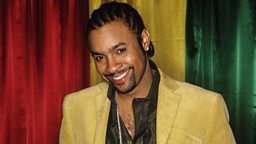
Shaggy’s 'It Wasn’t Me' almost wasn’t to be at all - the Jamaican dancehall crossover star later revealing that his label weren’t fans of the 2001 hit and nearly left it off his album 'Hot Shot' altogether.
It’s a good thing that 'It Wasn’t Me' was eventually released as it would go on to become the biggest-selling single of 2001 in the UK, with 1.15 million copies sold. Inspired by an Eddie Murphy routine from 1987 and featuring singer Rik Rok, the song is centred around a back-and-forth between Shaggy and Rok, telling the tale of a man caught committing infidelity who is urged to repeatedly deny his guilt.
While it might not sound like the premise for a chart hit, Shaggy believes the song's moral message is redeemed towards the end of the track - and this ultimately helped it to resonate more universally with audiences. The song concludes: "Need to tell her that I'm sorry for the pain that I've caused. You may think that you're a player but you're completely lost".
"At the end of it, he’s saying 'I’m not taking your advice, it is wrong,'" Shaggy in 2015.
Other artists to enjoy big hits in 2001 included Kylie, who's 00s comeback continued with chart-topper 'Can't Get You Out My Head', Radio 2's Sophie Ellis-Bextor with arguably her most memorable track 'Murder on the Dancefloor', So Solid Crew's innovative garage anthem '21 Seconds', Afroman's 'Because I Got High', while S Club 7 bagged two No.1s, the pop classic 'Don't Stop Movin' and the less well remembered 'Have You Ever'. And Shaggy himself was back at the chart summit later in the year with 'Angel' his fourth and final UK No.1 to date.
-
![]()
Watch Steps perform for Radio 2 Live
Steps had four top ten hits in 2001 before splitting up at the end of the year - 20 years on they're back together and you can see them performing their biggest hits for Radio 2 Live.
4. It was a golden year for girl groups...
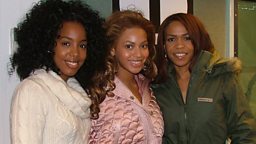
2001 was a big year for Destiny’s Child. Their third studio album 'Survivor' gained the threepiece their first UK No.1 record, also topping the chart in their native America. The record has since gone triple platinum in the UK, and spawned a number of big chart hits - its title-track, 'Bootylicious' and the Charlie’s Angels-soundtracking 'Independent Women Part I' which made it to No.1 in the UK the previous December.
That wasn’t all - 2001 would also see the group take home two Grammy Awards (‘Say My Name’ earned them Best R&B Vocal Performance by a Duo or Group and Best R&B Song) and release a Christmas album that featured the now alternative festive classic '8 Days of Christmas'. Beyoncé, Michelle and Kelly also paid tribute to those affected by the September 11th attacks by performing at The Concert For New York City in Madison Square Garden in October of that year, part of a bill that also included Jay-Z, Paul McCartney and Elton John.
Destiny's Child weren't the only major girl group of the year though. 2001 also saw Liverpudlians Atomic Kitten score two UK No.1s for 'Whole Again' and their cover of The Bangles' 'Eternal Flame'. Founding member Kerry Katona missed out on their new found success, replaced during the year by Jenny Frost. All Saints, meanwhile, released their last single before momentarily parting ways - 'All Hooked Up' reached No.7 in the UK Singles Chart.
5. ...and for boy bands
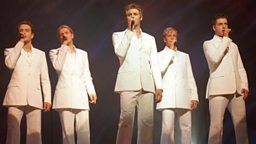
Westlife's chart dominance continued in 2001, scoring their seventh and eighth UK No.1s during the year with 'Uptown Girl' and 'Queen of My Heart' respectively. Their rendition of the Billy Joel classic, in particular, made a huge splash. Released as a Comic Relief charity single, it came with a humorous music video that parodied the original with help from the likes of Ioan Gruffudd, Tim McInnerny and Claudia Schiffer. The sixth biggest-single of 2001 in the UK, the song remains one of the group’s most loved - their second most popular song on Spotify, it's currently been streamed a total of 119 million times (correct as of September 2021).
2001 was also the year that another big boy band burst onto the scene, with Blue scoring a No.1 album in November with debut 'All Rise' and two No.1 singles over the course of the year, 'Too Close' and 'If You Come Back.' Their most memorable hit of the year was the one that didn’t land at top spot though. Their album’s title-track may have only made it to No.4 but has gone on to sell over 400,000 copies in the UK. Meanwhile 'Let's Dance' proved to be the final No.1 for 5ive, whose chart success may have straddled two centuries, but came to an end when the band split up in September of this year.
-
![]()
Watch Westlife perform for Radio 2 Live
Westlife had a stellar run of chart hits from the late 90s through to the early 00s - see them perform some of their biggest tracks for Radio 2 Live.
6. Everyone was singing "Voulez-vous coucher avec moi, ce soir?" - even if they didn't know what it meant
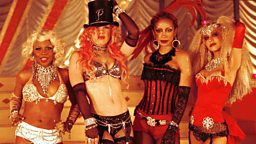
Way before Duolingo was invented, we all knew a little bit of French, if only for the iconic (and a little bit risqué) chorus from 'Lady Marmalade': "Voulez-vous coucher avec moi, ce soir?", or "Do you want to sleep with me tonight?" in English.
'Lady Marmalade' - written by Bob Crewe and Kenny Nolan - was originally recorded by Labelle in the 1970s. It would be covered by many artists over the years, including Italian singer Sabrina Salerno and All Saints - the latter version reaching No.1 in the UK in 1998 after being released as a doubler A-side single with 'Under the Bridge'.
However, it was the version released to tie in with the film Moulin Rouge! in 2001 that would capture imaginations the most and cement its place as a classic. Christina Aguilera, Lil' Kim, Mýa, and P!nk teamed up for an all-star rendition of the song, making it their own in the process (who can forget Xtina’s big hair and iconic “hey, hey, heyyy” ad-lib?). The song went platinum in both the UK and US, and became a symbol of strong female figures in the music industry.
Moulin Rouge! Director Baz Luhrmann later of 'Lady Marmalade': “You could feel the energy… all the women involved in that project were allowed to step outside, or given permission, to smash the silo that the industry was trying to put them in."
Mýa added: “When women come together with so much power, it’s also a safe space for us to say what the heck we want with no care given.”
7. Harry Potter took on Gandalf in a box office battle of the wizards
Disclaimer: Third-party videos may contain adverts.
Harry Potter or The Lord of the Rings? It’s almost impossible to choose. But in 2001, cinema-goers were treated to both for the very first time, with the two hugely-successful fantasy franchises making their box office debuts.
Legendary film critic Roger Ebert called Harry Potter and the Philosopher's Stone "an enchanting classic" and "a rip-roaring tale" - not bad feedback at all. And audiences were even more spell-bound. The film broke multiple box office records in the UK and brought in roughly £700 million worldwide in its initial run. A cultural phenomenon for all ages, it also spurred everyone to hop on a broom and pretend they were at Hogwarts (at least when nobody was watching).
Disclaimer: Third-party videos may contain adverts.
In December, The Lord of the Rings was introduced to film fans in the UK with its installment, The Fellowship of the Ring. Directed by Peter Jackson and based on the classic fantasy series by J. R. R. Tolkien, it launched the career of Elijah Wood, inspired Gollum impressions the world over and gained Jackson and co. 13 Oscar nominations and a Best Film win at the 2002 BAFTAs.
Those weren’t the only film franchises we were getting into in 2001 either. It was the year that we were introduced to our favourite green ogre (Shrek) as well as the new spectator sport of illegal street racing (The Fast and the Furious). Our fascination with the underworld also got a boost from the start of the Ocean's trilogy too.
8. Bridget Jones's Diary made being a singleton and wearing granny pants fashionable
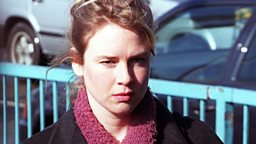
It made Mr. Right a household phrase; it liberated the wearing of big underwear; it replaced spinsters with singletons; and it turned Texas-born Renée Zellweger into a quasi British cultural icon. Yes, 2001 saw us all enthralled by Bridget Jones's Diary, an adaptation of Helen Fielding's popular book, and some of us are still arguing about whether we’re Team Hugh or Team Colin.
"I loved her humanity and her awkwardness," Zellweger later told the LA Times of why her character resonated with so many. "She’s in process, but she’s optimistic. She’s living her life in this way where she’s hilariously self-aware, and I think people relate to that."
The real marker of a truly classic film, though, is how well it lasts the test of time - and that has truly happened with Bridget Jones's Diary, which has so far spawned two sequels. "There’s rarely a day that goes by that somebody doesn’t want to talk about Bridget Jones when we meet in the street," Zellweger has revealed.
9. Former Beatle George Harrison died at the age of 58
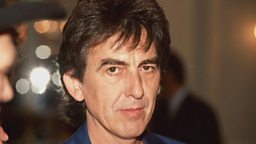
"He was a lovely guy and a very brave man and had a wonderful sense of humour," Sir Paul McCartney said as the music world mourned the death of fellow Beatle George Harrison, who lost his battle with cancer in November 2001. "He is really just my baby brother," McCartney continued. Longtime friend Gavin De Becker, meanwhile, said: "[George] died with one thought in mind - love one another."
A year after Harrison's passing, a tribute concert was held at the Royal Albert Hall in London. Eric Clapton, Jeff Lynne, Tom Petty and Jools Holland were among the performers on the night, as well as McCartney and Ringo Starr. Indian sitar player Anoushka Shankar also performed, a reference to Harrison's fascination with Indian instrumentation and Hindu spirituality (Anoushka's father Ravi Shankar had actually collaborated with Harrison). A re-issue of Harrison's debut solo hit 'My Sweet Lord' would top the charts in January 2002.
He might have sometimes been known as 'the Quiet Beatle', but Harrison's legacy as a musician spoke volumes. Elton John paid tribute by saying: "He was the sage of the Beatles. He found something worth more than fame... the trademark of a great guitarist is that you can always identify their sound, and with George you can always tell it’s George Harrison playing. All his solos are very melodic – you can almost sing his solos."
Other stars we lost in 2001 included Hitch-Hikers Guide to the Galaxy writer Douglas Adams, Joan Sims of the Carry On movies, actor Nigel Hawthorne of Yes, Minister fame, and RnB singer Aaliyah, who died in a plane crash, aged just 22, shortly after the release of her third album.
10. Wikipedia began its mission to catalogue everything on planet Earth (and beyond)

Remember that scene in Friends where Joey wants to be smarter so buys a volume of an encyclopaedia but could only afford one, so he only knows facts about things beginning with the letter 'V'? Well, That episode aired in 1997, but now Joey would have endless amounts of knowledge (over 6 million articles - and counting!) at his very fingertips thanks to the invention of the free-to-edit, online encyclopaedia Wikipedia, which launched in January 2001.
Co-founded by Jimmy Wales and Larry Sanger, the name combined the Hawaiian word for 'quick' - 'Wiki', with the Americanised ending of 'encyclopaedia'. In the first-ever news report about Wikipedia in August 2001, Welsh weekend newspaper Wales on Sunday wrote: "At the Wikipedia, anyone can write about any subject they know about. The idea is that over time, enough experts will offer their knowledge for free and build up the world's ultimate hand-built database of knowledge."
These days, Wikipedia has grown beyond anybody’s expectations, and there are currently editions in over 300 languages. In 2017, Wired magazine even heralded Wikipedia as .
11. A vision of the future arrived in the shape of Cornwall's Eden Project

These days, the Eden Project is firmly high on any sightseeing tick-list for those visiting Cornwall, or indeed the entire UK. But back when it launched in 2001, it felt like a mysterious, otherworldly entity.
"Nothing quite like the Eden Project has been seen this side of Quatermass and It Came From Outer Space," upon its launch. "Here is the biggest, oddest greenhouse ever - a mass of steel-framed bubbles moulded into the hollow of a former china-clay pit... Rarely has building technology been so close to nature's blueprints."
Costing £141 million, it was initially feared that the Eden Project would end up an expensive failure like the ill-fated Millennium Dome, but it has consistently drawn in crowds - attracting over 1 million visitors annually. Home to , it has also been used as a music venue, a filming location for James Bond (Die Another Day) and even hosts the World Pasty Championships every year!
12. We all wanted to know who shot Phil in EastEnders?
Outside 5 Albert Square, from the bushes with a hand gun. No, this isn't a game of Cluedo but instead the nation-gripping 'Whodunnit?' plot from EastEnders from March to April 2001.
Walford's biggest villain of the time Phil Mitchell had been making a long list of enemies, so soap fans were sent into a frenzy when he was shot outside his house. Was it ex-girlfriend Lisa Shaw? Lisa's new partner Mark Fowler? Perhaps Ian Beale? Or Steve Owen aka Martin Kemp of Spandau Ballet fame?
Almost 20 million people tuned in to see the big reveal, which was nearly three quarters of all TV viewers and making it the second most popular non-sport broadcast of the 2000s.
You probably were watching at the time yourself, but look away now if you're still avoiding spoilers 20 years on....
It was...
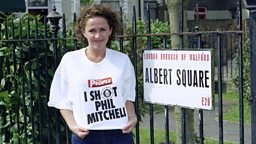
Lisa!
Yes, Phil's former girlfriend and later wife of Mark Fowler... Later confronted by Phil, Lisa revealed she'd been driven to despair by his mistreatment of her, including him sleeping with her best mate Mel!
It was a busy year for EastEnders, with a fourth weekly visit to Albert Square added later in 2001. As the battle of the soaps heated up, EastEnders' first Friday episode went up directly against Coronation Street (moved later due to an hour-long edition of Emmerdale), beating its northern rival in the ratings. It wasn't all bad news for Corrie though, with the ITV soap celebrating its 5,000th episode, having marked its 40th anniversary the previous year.
There was also a new rival in town, with ITV's Night and Day, adding to the wealth of soaps available. However, despite a theme tune from comeback queen Kylie, and stars such as Cathy Tyson, Gareth Hunt, Glynis Barber, and Lesley Joseph, this new offering was short-lived, finally put out of its misery less than two years later.
13. The Kumars, Phoenix Nights, Two Pints of Lager, and The Office ushered in a new era of sitcoms
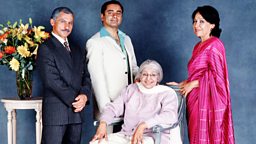
It wasn't just the soaps keeping us entertained, 2001 had us laughing at a range of new British sitcoms.
The Kumars at No. 42 saw Sanjeev Bhasker and his fictional family (with future wife Meera Syal playing his granny!) interview a range of unsuspecting stars, with two men more used to asking the questions, Michael Parkinson and Graham Norton, among the guests in series one.
Peter Kay and Paddy McGuinness formed a modern classic comedy duo as bouncers Max and Paddy in Phoenix Nights (which, of course, also starred Kay as disabled Bolton club owner Brian Potter). Two Pints of Lager and a Packet of Crisps, meanwhile, turned a modest pub order into a realistic look at mid-20s life and love, making a star of Sheridan Smith in the process - these days you can find Sheridan hosting her own Radio 2 series, Sheridan's Showstoppers.
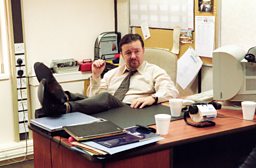
The Office, however, was perhaps the most ground-breaking of them all. The mockumentary format had been common in film since the 80s, but it was The Office that really paved the way for its use in television. We didn't need to have worked in the Slough branch of Wernham Hogg to relate, either. Instead, it felt like we all knew someone like Tim or Dawn or (if you were unlucky enough) Ricky Gervais' cringe-inducing boss David Brent. Being successfully adapted for an American audience (as well as elsewhere around the world), the original British series was recently by The Daily Telegraph.
14. Who Wants to be a Millionaire was rocked by a coughing scandal
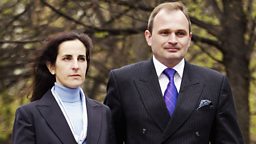
September 2001 saw Charles Ingram become only the third person to answer all 15 questions correctly on Who Wants to Be a Millionaire? to win the jackpot of £1 million. That would be enough to make headlines alone, but it wasn't long after the episodes had been recorded that producers had noticed something was wrong.
Charles and his wife Diana (both pictured above), along with fellow contestant Tecwen Whittock were subsequently charged with "procuring the execution of a valuable security by deception". Diana and Tecwen were accused of helping Charles cheat on the show by coughing as correct answers were called out by Chris Tarrant. All three were found guilty, given suspended prison sentences and fined.
The scandal was followed closely by the press and public, so much so that in April 2020 ITV aired a three-part drama based around the incident called Quiz. In it, Michael Sheen played Chris Tarrant and Matthew Macfadyen starred as Charles Ingram.
Other memorable TV moments of the year saw Jack Dee winning the first Celebrity Big Brother, in aid of Comic Relief, where he competed against Radio 2's Vanessa Feltz; Brain Dowling proved victorious in the second series of regular Big Brother; Richard and Judy quit ITV's This Morning to start a new Channel 4 series; ITV screened Premier League highlights for the first time, initially in a short-lived early evening slot; an episode of Channel 4's Brass Eye set a new record for complaints; it was all change for Saturday morning kids tv, with Live & Kicking replaced by The Saturday Show; and David Attenborough took us on a journey under the sea in the ground-breaking �鶹������ҳ��� One series The Blue Planet.
15. David Beckham left it late to secure England's place in the 2002 World Cup
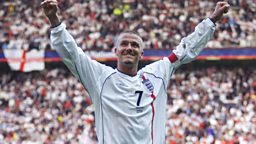
The fortunes of the England football team were on a downward trend following their near-miss at Euro 96. Glenn Hoddle and Kevin Keegan's tenures proved short-lived, David Beckham's sending-off and a penalty shoot-out defeat to Argentina meant a second round exit from the 1998 World Cup, while the team didn't even get out of the group stage at Euro 2000.
In January 2001, new manager Sven Goran Eriksson, the first non-Englishman to take charge of the team, took up his new role. Reaction to his appointment was mixed, but results showed early promise, none more so than a 5-1 demolition of Germany in Munich, which included a Michael Owen hat-trick.
However, qualification was still in the balance as England lined up against Greece the following month. Greece were leading 2-1, three minutes into stoppage time - with England heading into a play-off for qualification - when they gave away a free-kick. Step forward David Beckham who put the ball in the back of the net to make it 2-2 and send England, and their fledgling 'golden generation', into the 2002 World Cup in Japan and South Korea. Beckham went on to be named �鶹������ҳ��� Sports Personality of the Year 2001.
The news wasn't so good for the rest of the home nations, with Scotland, Northern Ireland, and Wales all missing out on a trip to Asia.
Elsewhere, it was a better year for Liverpool, who scored an unprecedented cup treble. Under manager Gérard Houllier they picked up the FA Cup and League Cup domestically, plus the UEFA Cup, beating Alavés of Spain with a extra-time golden goal.
16. Ellen MacArthur made waves sailing around the world
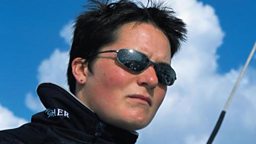
She's now a Dame, a charity founder, and a sailing legend, but it was 2001 when Ellen MacArthur first became a household name - the year that, at only 24 years of age, she completed the Vendée Globe, the 44,000 km around-the-world yacht race.
In her 60 ft yacht, the Kingfisher, MacArthur embarked on a mammoth 94-day voyage that saw her boat suffering substantial damages, herself enduring injuries and a near-disastrous moment where she woke to find herself only 15 metres from an iceberg.
"The boat did it. I was just the pilot," MacArthur upon completing the feat, in which she finished in second place. "I didn't expect anything like this... I have learned a lot about myself and the boat. You spend a lot of time thinking, reflecting, dreaming about so many things... The last couple of weeks have been very emotional."
Ellen's achievement set a new record for a woman sailing solo and non-stop around the world in a monohull - a record that stood for 20 years, finally broken in February 2021 by France's Clarisse Crémer
17. Tiger Woods completed the 'Tiger Slam' with his Masters win
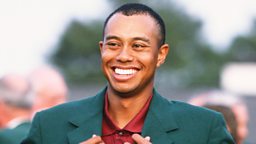
Tiger Woods may have dominated the golf world over several years in the late 90s and early 2000s, but 2001 saw the star make history by completing what became known as the "Tiger Slam". Having already won the US Open, the British Open and the PGA Championship over the previous 12 months, April 2001 saw Woods securing the fourth of the sport's major titles by winning the Masters. It was the first time any player had held all four titles at once - all this at the age of 25.
"I've succeeded in what I wanted to accomplish," Woods said after being presented with the winners' famous green jacket. "I'm sure it will go down as one of the top moments in our sport and I'm very proud of my achievements."
He would go on to win the Masters three more times: in 2002, 2005 and over a decade later in 2019.
At the end of the 2001 season though, Woods was ranked No.1 in the world, won the PGA Player of the Year award for the first time in a row and raked in a fortune in both prize money and sponsorship deals that is said to have been greater than what Michael Jordan had earned at the peak of his career.
"The kid has done things over the course of the last five years that nobody has ever done in golf before and, to a certain extent, no one's ever done in sports before," golf journalist Tim Rosaforte told CNN at the time.
18. Wildcard Goran Ivanišević made Wimbledon history, while Venus Williams retained her title

When it comes to Wimbledon, it turns out that it was fourth time lucky for Croatia's Goran Ivanišević. Having lost in the final on three occasions prior (in 1992, 1994 and 1998), Ivanišević entered the 2001 Wimbledon Championships as a firm outsider, ranked at 125th in the world at the time.
But by defeating Australian Pat Rafter in the Men's Singles final, Ivanišević achieved a memorable against-the-odds tennis feat. In doing so, he became the first unseeded player since Boris Becker in 1985 to win at Wimbledon and had previously broken British hearts by beating sixth seed Tim Henman in the semi-finals.
Ivanišević and Rafter put on a show in their final too, with �鶹������ҳ��� News reporting at the time: "In front of the most raucous crowd a Wimbledon final has ever seen, the players delivered a wonderful see-saw battle... In a stomach-churning final set the match went one way then the other, each player greeting a game won like the championship itself until the tumultuous finale."
An emotional Ivanišević said after his win: "I don't know if someone is going to wake me up and tell me I haven't won again. This was my dream all my life. I came here and nobody thought about me, but here I am holding the trophy."
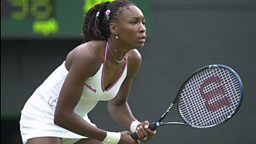
Meanwhile, the Women's Singles title was won for a second year running by Venus Williams, who defeated 19-year-old Belgian Justine Henin over three sets.
Williams went on to win the title again in 2005, 2007 and 2008, while also losing three finals to sister Serena in 2002, 2003 and 2009 as the pair's domination of the sport grew. After an eight-year gap, Venus returned to the final in 2017, losing on that occasion to Garbiñe Muguruza.
19. Ian McEwan's novel Atonement was published to great acclaim
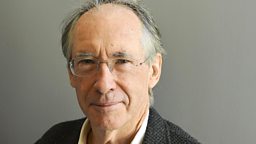
What were you reading back in 2001? Life of Pi by Yann Martel? Deception Point by Dan Brown? American Gods by Neil Gaiman? Perhaps, but most likely you (or someone you knew) were taken in by Ian McEwan's Booker Prize-shortlisted Atonement.
McEwan's book told the heart-wrenching tale of how a false identification could dramatically alter the lives of those involved. The Guardian called it an , while Time Magazine later listed it as one of their .
The story would later be transferred to the big screen for a 2007 adaptation starring James McAvoy, Saoirse Ronan, Benedict Cumberbatch and Keira Knightley (plus the latter's iconic green dress).
20. The late Eva Cassidy topped the charts... with a little help from Radio 2
Some great artists are only truly appreciated after their deaths - for example Van Gogh or Nick Drake. The same can be said of Eva Cassidy. Little known internationally during her lifetime, the folk singer reached No.1 in the UK Albums Chart in 2001 - five years after her passing and three years after the original release of the posthumous compilation record, 'Songbird'.
The �鶹������ҳ��� played a big role in UK audiences discovering Cassidy's work. A clip of Cassidy covering 'Over the Rainbow' was aired on Top of the Pops 2 during 2000, while Radio 2's Terry Wogan and Mike Harding also gave notable airplay to the aforementioned song as well as Sting cover 'Fields of Gold'.
Wogan producer, the late Paul Walters, who first recommended the record to Terry, : "I put on ‘Over the Rainbow’ in the office, and after doing this job 20 years, that’s the first time something made me stop what I was doing. You think nobody could take that away from Judy Garland, but Eva sang songs that 'belong to other people' in such a way that it destroys that myth. That moment was something very special for me, and I’m a hardened cynic."
'Songbird' would - rather unexpectedly - become 2001's eighth best-selling record, since going six times platinum.
Another musician to get a big push from Radio 2 this same year was Gordon Haskell. A former member of prog-rockers King Crimson and psych group The Fleur de Lys, Haskell recorded the heartfelt ballad 'How Wonderful You Are' in 2001 which, thanks to plays by the likes of Johnnie Walker, became a surprise hit as well as Radio 2's most-requested song even before its release. It was almost Christmas No.1 too, finishing in second spot behind Robbie Williams and Nicole Kidman's cover of 'Somethin' Stupid' in December 2001.
Radio 2 was also celebrating when it became the UK's most listened to radio station in May 2001, a position our lovely listeners have helped us maintain ever since!
21. Dido's No Angel was the year's best-selling album
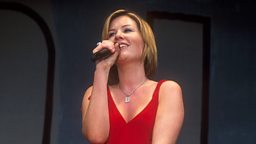
In a year of pop surprises, not even Dido herself could have guessed the extraordinary success that she would enjoy.
"If anyone said they knew what was going to happen with that album they’d be lying – nobody expected that, at all," she . "But there were moments that changed things for me and that’s the amazing thing about music.”
Aided by a star-turn guest spot on Eminem's 'Stan' (which sampled the opening lines of Dido's 'Thank You'), the singer-songwriter's debut 'No Angel' (originally released in 1999 in the US, but released to greater acclaim in 2001 in the UK) was a sleeper hit that spawned three Top 20 UK hits: 'Here with Me', 'Thank You' and 'Hunter'.
So taken were music fans the nation over by Dido's introspective lyricism and soothing vocal tones that the album was the second biggest-selling album of the 2000s in the UK (behind James Blunt). Then, in 2019, it was revealed to be No.9 in the Top 40 best selling albums of the 21st Century so far.
Other big selling albums of 2001 included Robbie Williams' 'Swing When You're Winning', Stereophonics' 'Just Enough Education To Perform', Travis' 'The Invisible Band', the self-titled debut album from Damon Albarn's new project Gorillaz, and Alicia Keys' debut 'Songs In A Minor.'
-
![]()
Listen to the Sounds of 2001
Claudia Winkleman introduces music, media, triumphs, tragedies and trivia from the year of 9/11, the iPod, Murder on the Dancefloor, David Brent, Hear'Say, Bridget Jones and much more. No comment, no analysis, no hindsight, no celebrity memories, just the 'sounds' of the year.
More Noughties Nostalgia
Like us on , on Instagram at , or follow us on Twitter
Listen to Radio 2 on �鶹������ҳ��� Sounds, or find out other ways you can listen.
